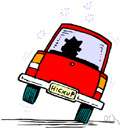wander
(redirected from wanders)Also found in: Thesaurus, Idioms, Encyclopedia.
wander
rove, ramble, move about without a fixed course: He tends to wander aimlessly throughout the city.
Not to be confused with:
wonder – something that causes feelings of wonder; feelings aroused by a marvel; to query in the mind: Sometimes we wonder what we’re here for.
Abused, Confused, & Misused Words by Mary Embree Copyright © 2007, 2013 by Mary Embree
wan·der
(wŏn′dər)v. wan·dered, wan·der·ing, wan·ders
v.intr.
1. To move about without a definite destination or purpose.
2. To go by an indirect route or at no set pace; amble: We wandered toward town.
3. To proceed in an irregular course; meander: The path wanders through the park.
4. To behave in a manner that does not conform to morality or norms: wander from the path of righteousness.
5. To turn the attention from one subject to another with little clarity or coherence of thought: I had a point to make, but my mind started wandering.
6. To be directed without an object or in various directions: His eyes wandered to the balcony.
v.tr.
1. To wander across or through: wander the forests and fields.
2. To be directed around or over: Her gaze wandered the docks.
n.
The act or an instance of wandering.
[Middle English wanderen, from Old English wandrian.]
wan′der·er n.
wan′der·ing·ly adv.
Synonyms: wander, ramble, roam, rove1, range, meander, stray, gallivant, gad1
These verbs mean to move about at random or without destination or purpose. Wander and ramble stress the absence of a fixed course or goal: The professor wandered down the hall lost in thought. "They would go off together, rambling along the river" (John Galsworthy).
Roam and rove emphasize freedom of movement, often over a wide area: "Herds of horses and cattle roamed at will over the plain" (George W. Cable)."For ten long years I roved about, living first in one capital, then another" (Charlotte Brontë).
Range suggests wandering in all directions: "a large hunting party known to be ranging the prairie" (Francis Parkman).
Meander suggests leisurely wandering over an irregular or winding course: "He meandered to and fro ... observing the manners and customs of Hillport society" (Arnold Bennett).
Stray refers to deviation from a proper course or area: "The camels strayed to graze on the branches of distant acacias" (Jeffrey Tayler).
Gallivant refers to wandering in search of pleasure: gallivanted all over the city during our visit. Gad suggests restlessness: gadded about unaccompanied in foreign places.
These verbs mean to move about at random or without destination or purpose. Wander and ramble stress the absence of a fixed course or goal: The professor wandered down the hall lost in thought. "They would go off together, rambling along the river" (John Galsworthy).
Roam and rove emphasize freedom of movement, often over a wide area: "Herds of horses and cattle roamed at will over the plain" (George W. Cable)."For ten long years I roved about, living first in one capital, then another" (Charlotte Brontë).
Range suggests wandering in all directions: "a large hunting party known to be ranging the prairie" (Francis Parkman).
Meander suggests leisurely wandering over an irregular or winding course: "He meandered to and fro ... observing the manners and customs of Hillport society" (Arnold Bennett).
Stray refers to deviation from a proper course or area: "The camels strayed to graze on the branches of distant acacias" (Jeffrey Tayler).
Gallivant refers to wandering in search of pleasure: gallivanted all over the city during our visit. Gad suggests restlessness: gadded about unaccompanied in foreign places.
American Heritage® Dictionary of the English Language, Fifth Edition. Copyright © 2016 by Houghton Mifflin Harcourt Publishing Company. Published by Houghton Mifflin Harcourt Publishing Company. All rights reserved.
wander
(ˈwɒndə)vb (mainly intr)
1. (also tr) to move or travel about, in, or through (a place) without any definite purpose or destination
2. to proceed in an irregular course; meander
3. to go astray, as from a path or course
4. (of the mind, thoughts, etc) to lose concentration or direction
5. to think or speak incoherently or illogically
n
the act or an instance of wandering
[Old English wandrian; related to Old Frisian wandria, Middle Dutch, Middle High German wanderen]
ˈwanderer n
ˈwandering adj, n
ˈwanderingly adv
Collins English Dictionary – Complete and Unabridged, 12th Edition 2014 © HarperCollins Publishers 1991, 1994, 1998, 2000, 2003, 2006, 2007, 2009, 2011, 2014
wan•der
(ˈwɒn dər)v.i.
1. to ramble without a definite purpose or objective; roam.
2. to go aimlessly or indirectly; meander: The river wanders among the rocks.
3. to extend in an irregular course or direction: Foothills wandered off to the south.
4. to move, pass, or turn idly, as the hand or the eyes.
5. (of the mind, thoughts, desires, etc.) to take one direction or another without conscious control.
6. to stray from a path, place, companions, etc.: The ship wandered from its course.
7. to deviate in conduct, belief, etc.; err; go astray.
v.t. 8. to travel about, on, or through: He wandered the streets.
[before 900; Middle English wandren, Old English wandrian]
wan′der•er, n.
Random House Kernerman Webster's College Dictionary, © 2010 K Dictionaries Ltd. Copyright 2005, 1997, 1991 by Random House, Inc. All rights reserved.
wander
Past participle: wandered
Gerund: wandering
| Imperative |
|---|
| wander |
| wander |
Collins English Verb Tables © HarperCollins Publishers 2011
ThesaurusAntonymsRelated WordsSynonymsLegend:
Switch to new thesaurus
| Verb | 1. |  wander - move about aimlessly or without any destination, often in search of food or employment; "The gypsies roamed the woods"; "roving vagabonds"; "the wandering Jew"; "The cattle roam across the prairie"; "the laborers drift from one town to the next"; "They rolled from town to town" wander - move about aimlessly or without any destination, often in search of food or employment; "The gypsies roamed the woods"; "roving vagabonds"; "the wandering Jew"; "The cattle roam across the prairie"; "the laborers drift from one town to the next"; "They rolled from town to town"go, locomote, move, travel - change location; move, travel, or proceed, also metaphorically; "How fast does your new car go?"; "We travelled from Rome to Naples by bus"; "The policemen went from door to door looking for the suspect"; "The soldiers moved towards the city in an attempt to take it before night fell"; "news travelled fast" maunder - wander aimlessly drift, err, stray - wander from a direct course or at random; "The child strayed from the path and her parents lost sight of her"; "don't drift from the set course" wander - go via an indirect route or at no set pace; "After dinner, we wandered into town" |
| 2. |  wander - be sexually unfaithful to one's partner in marriage; "She cheats on her husband"; "Might her husband be wandering?" wander - be sexually unfaithful to one's partner in marriage; "She cheats on her husband"; "Might her husband be wandering?"two-time - carry on a romantic relationship with two people at the same time play around, fool around - commit adultery; "he plays around a lot" | |
| 3. | wander - go via an indirect route or at no set pace; "After dinner, we wandered into town" rove, stray, roam, vagabond, wander, swan, ramble, range, drift, tramp, cast, roll - move about aimlessly or without any destination, often in search of food or employment; "The gypsies roamed the woods"; "roving vagabonds"; "the wandering Jew"; "The cattle roam across the prairie"; "the laborers drift from one town to the next"; "They rolled from town to town" meander, thread, wind, wander, weave - to move or cause to move in a sinuous, spiral, or circular course; "the river winds through the hills"; "the path meanders through the vineyards"; "sometimes, the gout wanders through the entire body" go forward, proceed, continue - move ahead; travel onward in time or space; "We proceeded towards Washington"; "She continued in the direction of the hills"; "We are moving ahead in time now" | |
| 4. |  wander - to move or cause to move in a sinuous, spiral, or circular course; "the river winds through the hills"; "the path meanders through the vineyards"; "sometimes, the gout wanders through the entire body" wander - to move or cause to move in a sinuous, spiral, or circular course; "the river winds through the hills"; "the path meanders through the vineyards"; "sometimes, the gout wanders through the entire body"go, locomote, move, travel - change location; move, travel, or proceed, also metaphorically; "How fast does your new car go?"; "We travelled from Rome to Naples by bus"; "The policemen went from door to door looking for the suspect"; "The soldiers moved towards the city in an attempt to take it before night fell"; "news travelled fast" snake - move along a winding path; "The army snaked through the jungle" wander - go via an indirect route or at no set pace; "After dinner, we wandered into town" | |
| 5. | wander - lose clarity or turn aside especially from the main subject of attention or course of argument in writing, thinking, or speaking; "She always digresses when telling a story"; "her mind wanders"; "Don't digress when you give a lecture" tell - let something be known; "Tell them that you will be late" |
Based on WordNet 3.0, Farlex clipart collection. © 2003-2012 Princeton University, Farlex Inc.
wander
verb
1. roam, walk, drift, stroll, range, cruise, stray, ramble, prowl, meander, rove, straggle, traipse (informal), go walkabout (Austral.), mooch around (slang), stravaig (Scot. & Northern English dialect), knock about or around, peregrinate He wandered aimlessly around the garden.
2. stray, roam, digress, get sidetracked, go off at a tangent She allowed her mind to wander to other things.
noun
wander off stray, roam, go astray, lose your way, drift, depart, rove, straggle The child wandered off and got lost.
wander off something deviate from, diverge from, veer from, swerve from, digress from, go off at a tangent from, go off course from, lapse from He has a tendency to wander off the point when he's talking.
Collins Thesaurus of the English Language – Complete and Unabridged 2nd Edition. 2002 © HarperCollins Publishers 1995, 2002
wander
verb1. To move about at random, especially over a wide area:
2. To walk at a leisurely pace:
Informal: mosey.
The American Heritage® Roget's Thesaurus. Copyright © 2013, 2014 by Houghton Mifflin Harcourt Publishing Company. Published by Houghton Mifflin Harcourt Publishing Company. All rights reserved.
TranslationsSelect a language:
Spanish / Español
wander
[ˈwɒndəʳ]B. VI
1. (for pleasure) → pasear; (aimlessly) → deambular, vagar, errar
we spent the morning wandering round the old town → pasamos la mañana paseando por el casco antiguo
they wandered aimlessly through the streets → iban deambulando or vagando por las calles
to wander round the shops → curiosear or pasearse por las tiendas
we spent the morning wandering round the old town → pasamos la mañana paseando por el casco antiguo
they wandered aimlessly through the streets → iban deambulando or vagando por las calles
to wander round the shops → curiosear or pasearse por las tiendas
2. (= stray) to wander from the path → desviarse or alejarse del camino
the sheep had wandered into the next field → las ovejas se habían metido en el prado de al lado
the sheep had wandered into the next field → las ovejas se habían metido en el prado de al lado
3. (fig) [person] (in speech) → divagar
to wander from or off the point → salirse del tema
to let one's mind wander → dejar vagar la imaginación
his eyes wandered round the room → paseó la mirada por la habitación
his attention wandered for a moment and the milk boiled over → se distrajo or despistó un momento y se le salió la leche
my attention wandered a bit in the second half of the film → perdí un poco la concentración or me distraje or me despisté en la segunda mitad de la película
to wander from or off the point → salirse del tema
to let one's mind wander → dejar vagar la imaginación
his eyes wandered round the room → paseó la mirada por la habitación
his attention wandered for a moment and the milk boiled over → se distrajo or despistó un momento y se le salió la leche
my attention wandered a bit in the second half of the film → perdí un poco la concentración or me distraje or me despisté en la segunda mitad de la película
C. VT [+ streets, hills] → recorrer, vagar por
to wander the world → recorrer el mundo entero
he had wandered the seven seas in search of it (liter) → había surcado los siete mares en su busca (liter)
to wander the world → recorrer el mundo entero
he had wandered the seven seas in search of it (liter) → había surcado los siete mares en su busca (liter)
wander about wander around VI + ADV → deambular
wander off
A. VI + ADV the children wandered off into the woods → los niños se alejaron sin rumbo y entraron en el bosque
don't go wandering off → no te alejes demasiado
don't go wandering off → no te alejes demasiado
B. VI + PREP
see wander B3
see wander B3
Collins Spanish Dictionary - Complete and Unabridged 8th Edition 2005 © William Collins Sons & Co. Ltd. 1971, 1988 © HarperCollins Publishers 1992, 1993, 1996, 1997, 2000, 2003, 2005
wander
(ˈwondə) verb1. to go, move, walk etc (about, in or on) from place to place with no definite destination in mind. I'd like to spend a holiday wandering through France; The mother wandered the streets looking for her child.recorrer; vagar, errar; pasearse sin propósito
2. to go astray or move away from the proper place or home. His mind wanders; My attention was wandering.extraviarse; divagar, viajar
nounˈwanderer nounˈwanderlust noun the wish to travel. He's always travelling – his wanderlust will never be satisfied. pasión por viajar, ansia de ver mundo
Kernerman English Multilingual Dictionary © 2006-2013 K Dictionaries Ltd.
wander
→ deambularMultilingual Translator © HarperCollins Publishers 2009
wander
v. vagar; [to lose one's way] desviarse, perderse, extraviarse.
English-Spanish Medical Dictionary © Farlex 2012